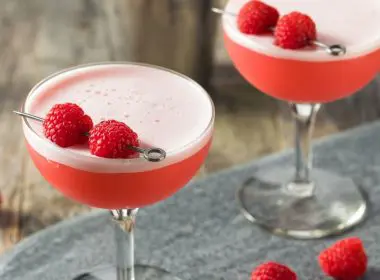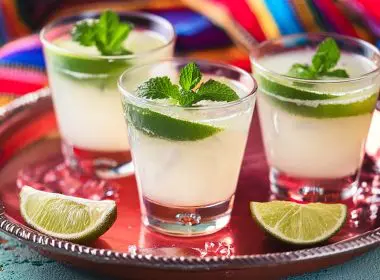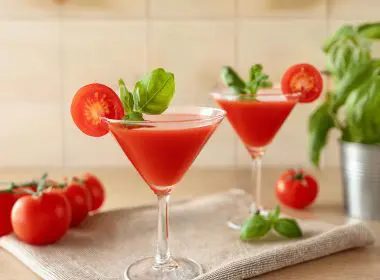The White Negroni is a modern riff on the classic Negroni, instantly recognisable for its lighter look and bright, floral-driven flavour. Instead of the ruby-red bitterness of Campari, it leans on gentian liqueur and a pale vermouth to create a more delicate balance of bitter, citrus, and botanical notes.
White Negroni (Negroni Bianco)
PREP TIME 5 min

QUICK TIPS
INSTRUCTIONS
Add all the ingredients to a mixing glass with ice
Stir well for at least 30 seconds
Strain into a chilled rocks glass with fresh ice
Garnish with a lemon twist
Serve
History of the White Negroni
British bartender Wayne Collins crafted the White Negroni cocktail as an inventive alternative to its more famous cousin, debuting it at Vinexpo in Bordeaux, France, in the early 2000s. This twist on the classic Negroni is a lighter, more aromatic sipping experience that still retains the essence of the original. While the traditional version draws its deep red colour from Campari (opens in new window), this recipe replaces it with Cinzano Vermouth Bianco.
At its core, the White Negroni is a balanced blend of three key ingredients: a botanical gin, a bitter gentian root liqueur (often Suze), which gives the cocktail its bright yellow colour, and a fortified wine component. Each element contributes to the complex flavour profile, with the floral and citrus notes of the other ingredients softening the bitterness of the drink.
White Negroni vs classic Negroni
Want to know how the new riff stacks up against the OG? Here’s the quick lowdown:
- Classic Negroni → Equal parts Campari + gin (opens in new window) + sweet vermouth (opens in new window) → bold, bitter, crimson.
Stronger + bitter.
- White Negroni → gentian liqueur + gin + Cinzano Bianco (opens in new window) → herbal, floral, golden.
Lighter + citrussy.
Curious about the original? Check out our Negroni recipe page.
Garnishing and serving like a pro
First rule? Simplicity is key. When it comes to White Negroni ingredients, the garnish should complement rather than clutter. Here are a few go-to options:
- Lemon twist: A classic choice that adds a burst of citrus aroma that just works.
- Grapefruit twist: Leans into the gentian liqueur’s bitterness while adding a touch of sweetness.
- Rosemary or thyme: Feeling experimental? Add a sprig to create a herbal complexity that plays beautifully with the cocktail’s bitter notes.
- Edible flowers (like violas or pansies): Enhance the floral side and visual appeal of the drink, while also adding a subtle hint of flavour.
Presentation tips to put your White Negroni over the top
What is a White Negroni, if not the essence of elegance? Let your glassware reflect that. A classic rocks glass allows the pretty golden hues of the cocktail to shine through. If you’re making a White Negroni Highball (see below), a tall, slender highball glass is ideal, especially when paired with crystal-clear ice cubes.
Large, slow-melting cubes are your best bet. They chill the drink without watering it down too fast, allowing you to savour each sip. Clear ice will also add a touch of sophistication to your presentation, making your White Negroni look as good as it tastes.
No matter which approach you choose, remember to keep it elegant — this is a modern aperitivo drink.
Get schooled: A Tale of Two Cocktails: Manhattan Drink vs Old Fashioned
Amazing food pairings to try
The White Negroni recipe creates a versatile sipper that pairs well with a variety of dishes, thanks to its balanced flavours and dapper bitterness. Here are some pairing ideas to elevate your clinking experience and add a touch of Italian aperitivo vibe:
Easy eats
- Olives: The briny, slightly bitter taste of olives complements the bitterness of the White Negroni perfectly.
- Almonds: Lightly toasted almonds offer a nutty contrast to the cocktail’s floral notes, making for a satisfying snack.
- Goat cheese crostini: The creamy texture and tangy flavour of goat cheese work harmoniously with the cocktail’s botanical elements.
Mains
- Grilled fish: A light, grilled fish like sea bass or halibut pairs wonderfully with the White Negroni. The cocktail’s citrus and herbal notes enhance the delicate fish flavours.
- Risotto primavera: A creamy, vegetable-laden risotto provides a rich contrast to the drink’s bitterness while the fresh vegetables mirror the cocktail’s floral and citrus notes.
- Ancient grains salad: A quinoa salad with fresh herbs, citrus, and avocado is an excellent vegan pairing. The salad’s brightness and creaminess balance the cocktail’s bitterness, making for a delicious combination.
Desserts
- Lemon tart: The tartness of a lemon dessert echoes the citrus notes in the White Negroni, offering a zesty end to your meal.
- Panna cotta: A light, vanilla-flavoured panna cotta is a perfect match; its smooth texture and subtle sweetness enhance the cocktail’s delicate flavours.
- Coconut sorbet: This delightful vegan dessert option offers a light yet creamy finish that complements the drink’s aromatic profile.
Read next: The Complete History of the Negroni
White Negroni variations
The White Negroni is a fantastic base for experimentation, and there are plenty of variations to explore. For those looking to switch things up, here are a few ideas:
White Negroni Sbagliato
The White Negroni Sbagliato is a playful twist on the original, where sparkling wine replaces the gin, yielding a lighter, bubblier version of the cocktail. Simply swap out the gin for a dry Prosecco or Champagne and serve in a stemmed glass.
White Negroni Highball
To make a White Negroni Highball, follow the original recipe, but instead of serving it in a rocks glass, pour the cocktail into a highball glass filled with ice. Top it off with soda water and gently stir to combine. The result is a crisp, invigorating drink that retains the complex flavours of the French ingredients, while adding a touch of effervescence.
This variation is ideal for those who enjoy a longer, more relaxed cocktail experience. The soda water not only lightens the bitterness but also enhances the botanical and citrus notes, making it an excellent choice for pairing with lighter dishes or enjoying on its own as a light and lovely aperitif.
Botanical gin variations
The type of gin you use can significantly alter the flavour of your White Negroni. A gin with more floral or citrus botanicals will bring out those notes in the cocktail, whereas a more juniper-forward gin will emphasise the drink’s herbal side. Experiment with different gins to find your perfect sip.
Learn more: 8 Best Gins for Your Favourite Negroni
More amazing recipes to try
If our White Negroni recipe has tempted you to try something new, may we suggest one of the following:
- Aperol Negroni: Bright, bittersweet, and effortlessly stylish ― an aperitivo that glows.
- Pegu Club: Tart, zesty, and timeless ― a cocktail with serious old-school cool.
- Americano: Light, bittersweet, and easy-going ― a classic aperitivo sipper.
- Kingston Negroni: Bold, funky, and full of swagger ― the Negroni with island energy.
- Coffee Negroni: Smooth, bittersweet, and slightly edgy ― your cocktail hour pick-me-up.
- Negroni Sbagliato: Bubbly, bittersweet, and cheeky ― the life of the party.
- Cynar Negroni: Earthy, complex, and slightly mysterious ― a twist with real depth.
- Frozen Negroni: Chilled, punchy, and fun ― the ultimate hot-day upgrade.
- Christmas Negroni: Spiced, cosy, and celebratory ― holiday spirit in a glass.
- Oaxacan Negroni: Smoky, rich, and adventurous ― a Negroni with serious edge.
Whether you stick to the White Negroni recipe or experiment with these variations, you’re sure to find a version that suits your taste. More than just a drink, it’s a canvas for creativity, offering endless opportunities to explore new flavours and combinations. Visit the Bulldog Gin (opens in new window) and Cinzano (opens in new window) website to stock up on aperitivo essentials and remember to sign up for our delicious newsletter to stay in the mix.


















